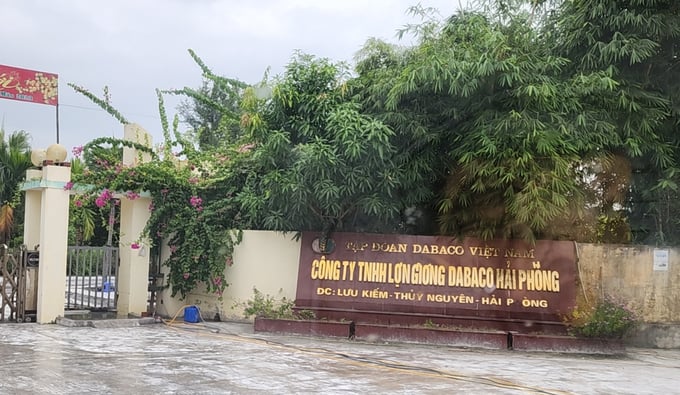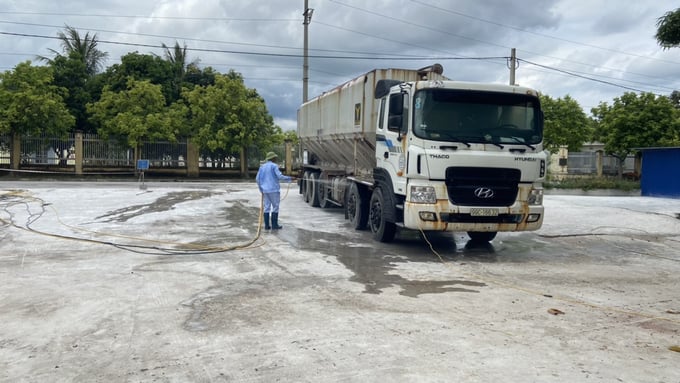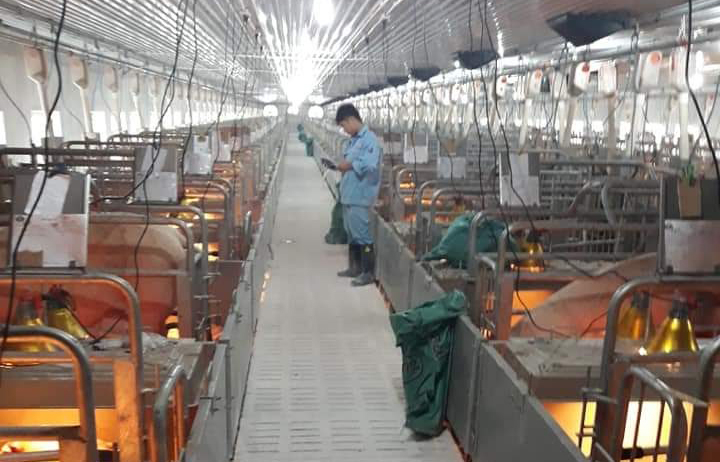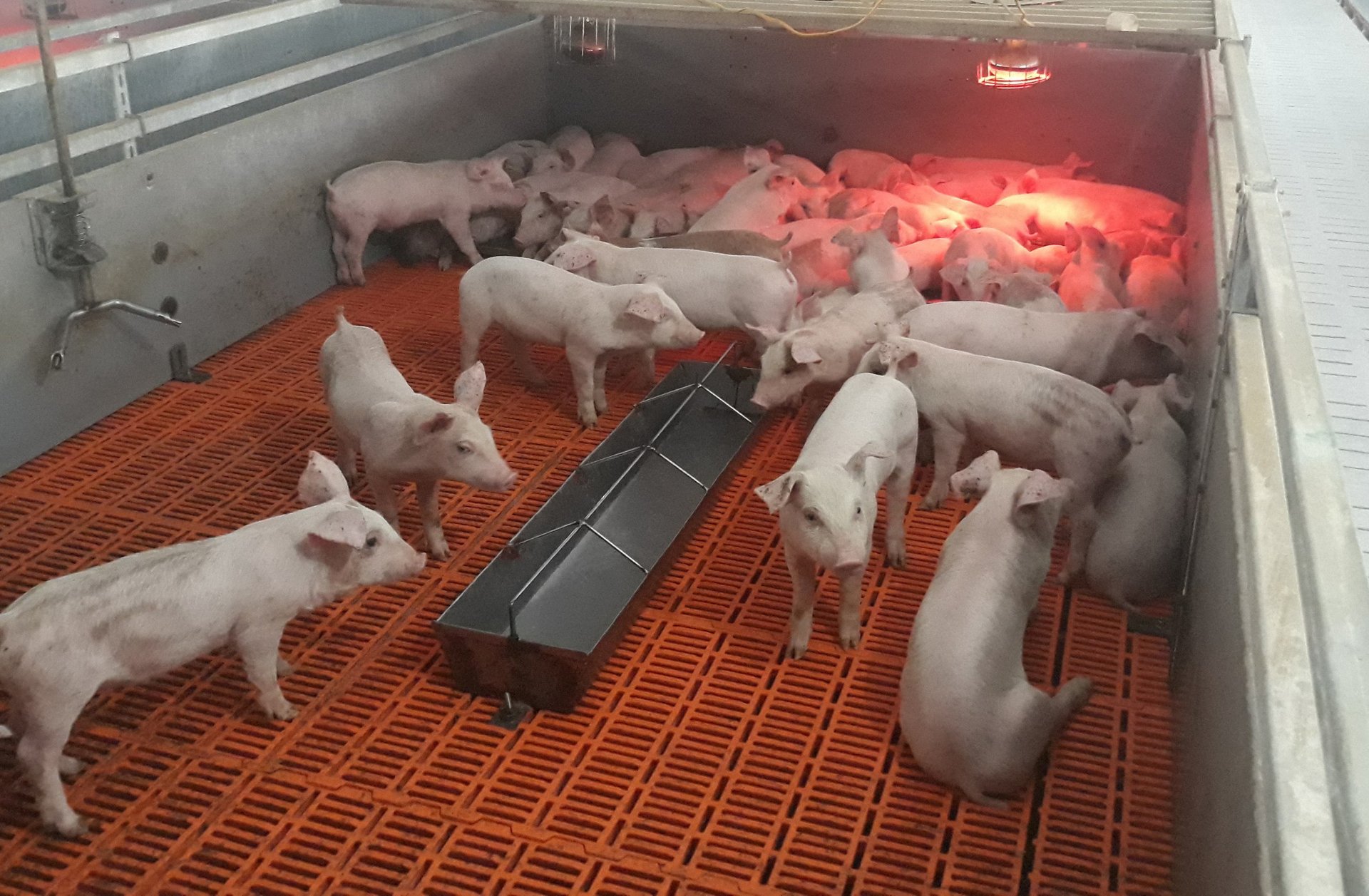June 18, 2025 | 22:45 GMT +7
June 18, 2025 | 22:45 GMT +7
Hotline: 0913.378.918
June 18, 2025 | 22:45 GMT +7
Hotline: 0913.378.918

DABACO Hai Phong Pig Co., Ltd still remains in the midst of epidemics thanks to strict application of biosecurity breeding processes. Photo: Dinh Muoi.
"No exports, no imports" policy
In recent times, the African swine fever epidemic has continued to escalate, leaving pig farmers struggling. In Hai Phong, small-scale pig farmers are hesitant to restock their herds, while only large farms and sizable livestock enterprises with comprehensive breeding processes, robust disease prevention measures, and biosecurity standards in place are still raising pigs for profits.
Observations at Dabaco Hai Phong Swine Breeding Co., Ltd. indicate that from 2020 until now, amidst the ongoing complex disease situation, the costs of pig farming have been steadily rising, causing numerous challenges for the industry.
However, the implementation of biosecurity measures has helped reduce the risk of disease transmission. Beyond just African swine fever, this approach has proven effective in preventing various bacterial and other diseases among pig herds. Therefore, by prioritizing strong biosecurity practices, pig farmers can maintain high productivity and achieve favorable economic outcomes.
Mr. Le Quang Hien, the Director of Dabaco Hai Phong Pig Co., Ltd., mentioned that the company currently raises 100% purebred sows and breeding pigs, with a scale of 1,800 sows and 50,000 meat pigs. For pig farming, especially breeding pigs, in the current complex disease environment, strict adherence to biosecurity measures is essential and must be executed rigorously and consistently.

Disinfecting all vehicles before entering the premises of Dabaco Hai Phong Pig Co., Ltd. Photo: Quang Dung.
At the company, disease prevention and control are carried out in 3 - 4 steps, and biosafety is the top priority and a matter of survival. Stringent protocols for disease prevention and control are applied to vehicles entering and exiting the premises, visitors, and staff.
Individuals arriving to work at the company are required to visit a station for hand and foot washing, shoe disinfection, vehicle washing, and surface cleaning. Everyone is then isolated for a minimum of 1 hour, or even up to a day, before being allowed to enter the company gates.
Following this initial step, the company's specialized biosafety team conducts vehicle and personnel checks before admitting them to the disinfection chamber. Personal items and clothing are disinfected and placed in a UV chamber for 30 minutes.
To ensure that the virus cannot infiltrate the livestock area, during this time, individuals must also shower and change into pre-disinfected company clothing before entering the administrative area.
Inside the administrative zone, there are two separate areas, and moving from one area to the other requires a 24-hour isolation period. In the case of technical personnel needing to access the livestock area, a 2-day isolation period is mandatory.
"At this time and in the foreseeable future, as an effective vaccine for African swine fever is not yet available, ensuring biosecurity remains the top priority for the company", shared Mr. Hien.

Thanks to good disease prevention procedures, the breeding of piglets of Dabaco Hai Phong Pig company is still highly effective. Photo: Dinh Muoi.
A closed process
According to Mr. Hien, the livestock production activities here are carried out through a closed-loop process. The company has teams of veterinarians and engineers who follow a closed-loop process from breeding to biosecurity procedures.
As for the biosecurity process, it is implemented for everything, from food and water to human entry, rodent and fly control, mosquito control, and more. From the largest to the smallest detail, all are managed within a closed-loop process to protect the breeding herd.
Thanks to the effective implementation of disease prevention processes, especially in terms of biosecurity in livestock, from 2020 to the present, despite the complex developments and increased costs due to African swine fever, the livestock operations at Dabaco Hai Phong Pig company still achieve high productivity.
Just within the first 6 months of 2023, at Dabaco, the farrowing rate remains at 90-92%, with 13 piglets per sow and a weaning rate of 12.5%. The weaning-to-sow ratio reaches over 30 piglets per sow per year. "These are achievements we've reached in the recent period, while African swine fever is still prevalent, and we are effectively practicing biosecure livestock operations", Mr. Hien reassured.
Drawing from lessons and experiences gained, Mr. Hien shared that given the ongoing complexity of African swine fever and the still-undergoing vaccine trials, biosecurity measures remain essential for the survival of both the company and the entire livestock industry.
When livestock breeders follow a closed-loop breeding process and ensure complete vaccination procedures, the risk of contagious diseases can be minimized. Even for small-scale livestock households, whether they are few or numerous, establishing a bio-secured livestock system is imperative. The focus is on preventing bacteria and viruses from entering the breeding area and farm premises.

Bio-secured livestock farming is considered a matter of survival for pig breeders in the current period. Photo: Quang Dung.
In livestock farming, households must have well-structured and meticulous processes, and they need to source clean breeding stock. Within the livestock farming process, ensuring complete vaccination against various diseases such as classical swine fever, African swine fever, and foot-and-mouth disease is crucial.
"The experiences and knowledge that we currently possess and implement demonstrate that for successful pig farming and maintaining productive and healthy herds, effective biosecurity measures, sanitation, disinfection, and isolation are still the key, the most essential solutions for livestock breeders, regardless of scale", expressed Mr. Hien.
Within Hai Phong City, there are currently 170 pig farms, including 11 large-scale farms, 73 medium-sized farms, and 86 small-scale farms, totaling approximately 138,567 pigs, a decrease of nearly 5% compared to the same period in 2022.
Ever since the beginning of 2023, livestock and poultry populations have maintained stable development, with no signs of dangerous infectious outbreaks observed. However, given the complex situation of diseases nationwide, the agricultural sector of Hai Phong City has issued directives requiring district-level People's Committees to oversee and monitor disease situations even within individual livestock farms, slaughterhouses, pork trade locations, and pork product facilities. This is to promptly detect and report any suspected or confirmed cases of diseases and to implement timely measures to prevent the spread of infections.
Furthermore, local authorities need to proactively allocate human and material resources to implement the approved animal disease prevention and control plans within their jurisdictions. They should also oversee the organization and implementation of vaccination campaigns for livestock and poultry herds immediately after receiving vaccines, following the city's vaccination plan.
Mr. Bui Van Luyen - Deputy Head of the Livestock and Veterinary Department of Hai Phong City, stated: Biosecurity in livestock farming, disease safety are very important technical measures. This is because these measures are cost-effective and economical compared to disease control. They ensure the health and high productivity of livestock and poultry, reduce veterinary medicine costs, and provide consumers with quality assured livestock and poultry products.
The three fundamental elements of biosecurity in livestock farming are: isolation, hygiene, and disinfection. Isolation involves creating distances and barriers to prevent any animals or objects from entering or exiting the farming area unless necessary. If the disease agent cannot penetrate the rearing area, then transmission cannot occur. Hygiene is essential for any items passing through the separation barrier (both in and out); they must be thoroughly cleaned and sanitized, removing up to 90% of contamination. Disinfection involves using disinfectants with appropriate concentrations to eradicate disease agents. Effective disinfection, after thorough cleaning, can eliminate the remaining 10% of contaminants.
Translated by Nguyen Hai Long
![Turning wind and rain into action: [9] Digitizing hydrometeorological data in response to climate change](https://t.ex-cdn.com/nongnghiepmoitruong.vn/608w/files/news/2025/06/17/z6704423696987_15fd32ffc26d590d204d520c9dac6786-nongnghiep-165943.jpg)
(VAN) Farmers have begun accessing hydrometeorological applications to adjust their cropping schedules, aiming to ensure productivity and adapt to climate change.
![Turning wind and rain into action: [8] Real-time salinity detection and early warning technology](https://t.ex-cdn.com/nongnghiepmoitruong.vn/608w/files/news/2025/06/17/z6704423696987_15fd32ffc26d590d204d520c9dac6786-nongnghiep-151127.jpg)
(VAN) Thanks to the integration of modern hydrological-hydraulic models, remote sensing technologies, and artificial intelligence, the accuracy of hydrological forecasting has significantly improved.
![Turning wind and rain into action: [7] Early disaster warnings help marine farmers minimize losses](https://t.ex-cdn.com/nongnghiepmoitruong.vn/608w/files/news/2025/06/17/z6704423696987_15fd32ffc26d590d204d520c9dac6786-nongnghiep-142942.jpg)
(VAN) In recent years, thanks to early disaster warnings and forecasting, marine farmers in Khanh Hoa province have been able to reduce risks and losses, thereby improving production efficiency.
![Turning wind and rain into action: [6] ‘Four on-the-spot’ disaster management software](https://t.ex-cdn.com/nongnghiepmoitruong.vn/608w/files/news/2025/06/17/e5a48259d6a262fc3bb3-nongnghiep-183800.jpg)
(VAN) By simply activating the scenario on the disaster management software, the relevant authorities immediately know how many households need to be evacuated, where to evacuate them to, and by what means of transportation…
![Turning wind and rain into action: [5] Hue applies modern technology in disaster forecasting](https://t.ex-cdn.com/nongnghiepmoitruong.vn/608w/files/news/2025/06/17/z6704423696987_15fd32ffc26d590d204d520c9dac6786-nongnghiep-093938.jpg)
(VAN) In Hue city, modern technology has recently been applied in meteorological and hydrological forecasting and warning, helping to reduce the damage caused by natural disasters.

(VAN) A cutting-edge farming technique being implemented on an experimental ranch in Arizona's Sonoran Desert has already saved a billion gallons of water over five years, according to Civil Eats.

(VAN) Poultry and pig production and the environment can be boosted through enhanced water technology, according to new research.